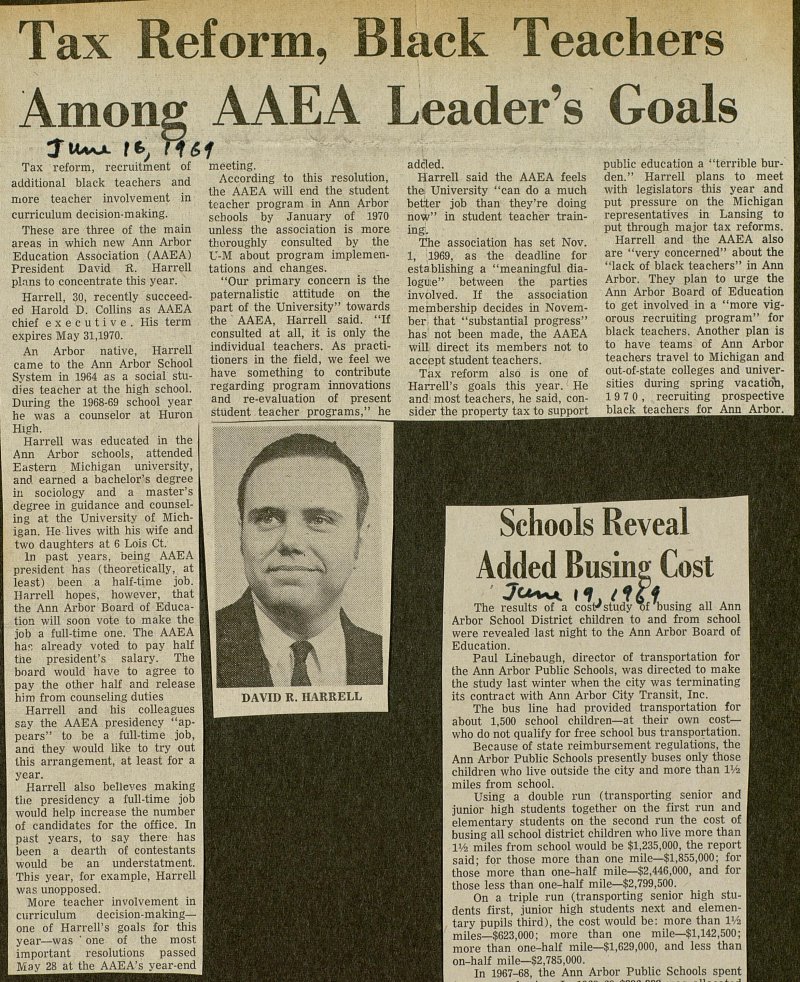Tax Reform, Black Teachers Among Aaea Leader's Goals

Tax reform, recruitment of additional black teachers and more teacher involvement in curriculum decision-making. These are three of the main areas in which new Ann Arbor Education Association (AAEA) President David ít. Harrell plans to concéntrate this year. Harrell, 30, recently succeeded Harold D. Collins as AAEA chief executive. His term expires May 31,1970. An Arbor native, Harrell came to the Ann Arbor School System in 1964 as a social studies teacher at the high school. During the 1968-69 school year he was a counselor at Huron High. I Harrell was educated in the Ann Arbor schools, attended Eastern Michigan university, and earned a bachelor's degree in sociology and a master's degree in guidance and counseling at the University of Michigan. He lives with his wife and two daughters at 6 Lois Ct. In past years, being AAEA president has (theoretically, at least) been a half-time job. Harrell hopes, however, that the Ann Arbor Board of Education will soon vote to make the job a Mi-time one. The AAEA I har, already voted to pay half the president's salary. The board would have to agree to pay the other half and release him from counseling duties Harrell and his colleagues say the AAEA presidency "appears" to be a full-time job, and they would like to try out this arrangement, at least for a year. Harrell also belleves making the presidency a full-time job would help increase the number of candidatos for the office. In past years, to say there has been a dearth of contestants would be an understatment. This year, for example, Harrell was unopposed. More teacher involvement in curriculum decision-making - one of Harrell's goals for this year - was ' one of the most important resolutions passed May 28 at the AAEA's year-end meeting. According to this resolution, the AAEA will end the student teacher program in Ann Arbor schools by January of 1970 unless the association is more thoroughly consulted by the U-M about program implementations and changes. "Our primary concern is the paternalistic attitude on the part of the University" towards the AAEA, Harrell said. "If consulted at all, it is only the individual teachers. As practitioners in the field, we feel we have something to contribute regarding program innovations and re-evaluation of present student teacher programs," he adc'led. Harrell said the AAEA feels the University "can do a much better job than they're doing now" in student teacher training'. The association has set Nov. 1, 1969, as the deadline for establishing a "meaningful dialogue" between the parties involved. If the association membership decides in November, that "substantial progress" has not been made, the AAEA will direct its members not to accept student teachers. Tax reform also is one of Harrell's goals this year. He and most teachers, he said, consider the property tax to support public education a "terrible burden." Harrell plans to meet with legislators this year and put pressure on the Michigan representatives in Lansing to put through major tax reforms. Harrell and the AAEA also are "very concerned" about the "lack of black teachers" in Ann Arbor. They plan to urge the Ann Arbor Board of Education to get involved in a "more vigorous recruiting program" for black teachers. Another plan is to have teams of Ann Arbor teachers travel to Michigan and out-of-state colleges and universities during spring vacatiöh, 19 7 0, recruiting prospective black teachers for Ann Arbor.